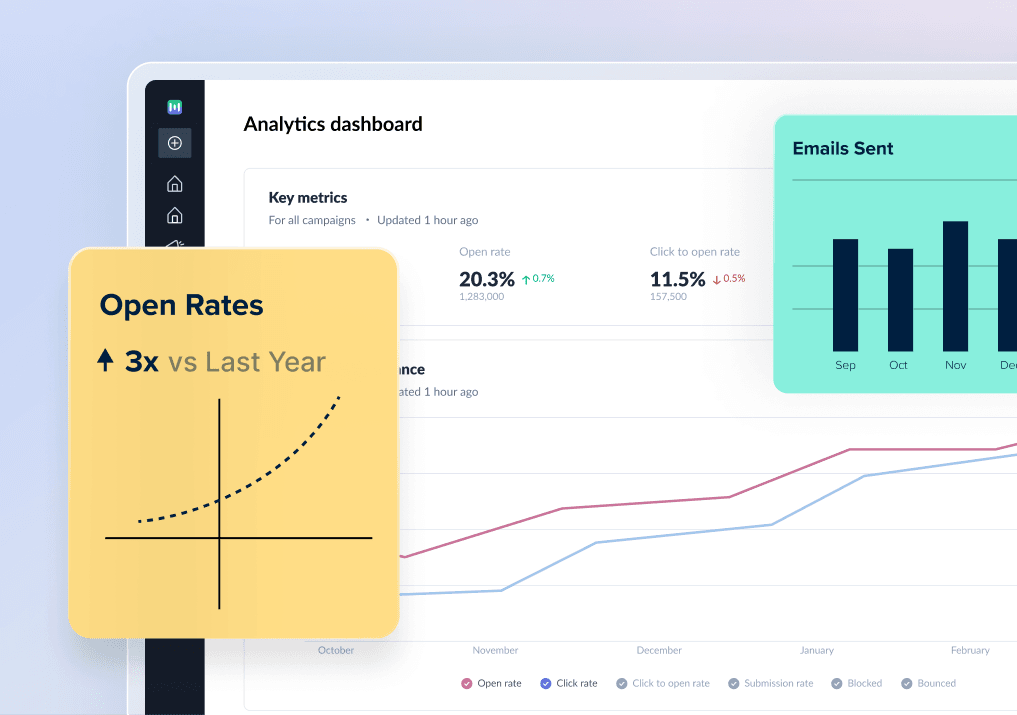15 Best Api Management Software
Are you looking for an Api Management Software for your business? You have come to the right page. This guide will help you discover the best Api Management Software and along with a deep dive into their features, pricing, rating, etc.

What is API Management Software?
API management software is a type of software that allows organizations to design, deploy, and manage APIs (application programming interfaces). It provides a central location for hosting, scaling, and securing APIs. API management software is used by businesses to simplify the process of creating, publishing, and managing APIs, resulting in increased efficiency and cost-effectiveness. It also provides analytics and tracking capabilities to monitor API usage and performance. Overall, API management software plays a crucial role in ensuring that businesses can easily integrate their applications with other systems.
How API Management Software work or function?
API management software functions as an intermediary between an organization's APIs and the developers who use them. It provides a central platform to manage API access, monitor usage, and enforce security policies. API management software also helps teams collaborate on API development and documentation, ensuring consistency and accuracy, while simplifying the process of versioning and release management. With these capabilities, organizations can streamline their API strategy and maximize the value of their digital assets.
Benefits of API Management Software?
API Management Software Benefits:
- API management software simplifies the process of designing, deploying, and managing APIs, reducing development time and costs.
- It improves security by providing comprehensive authentication and access controls for APIs.
- It helps optimize API performance by monitoring usage metrics and identifying potential issues.
- It enables better collaboration with third-party developers by providing documentation, testing tools, and developer portals.
- It facilitates integration between different systems and applications, streamlining workflows and improving efficiency.
How we curated this list
We conducted extensive research to identify a wide range of software options within each category. This involved exploring online resources, industry publications, software directories, and user reviews. Please note that the pricing and features mentioned here are subject to change. We recommend you to visit the product website for the latest information before making a decision.

#1
IBM API Connect
Product Description
IBM API Connect is software to rapidly create, secure and manage APIs. IBM API Connect can be deployed in any Red Hat OpenShift environment. It’s also available as SaaS in a shared or dedicated instance, and as part of IBM Cloud Pak for Integration.
Pros and Cons
- IBM API Connect offers an intuitive experience that helps to consistently create, manage, secure, socialize and monetize APIs, and thus helps to power digital transformation both on-premises and across clouds.
- It uses an enterprise-grade API gateway to manage cybersecurity risks and help protect data, and provides trustworthy architecture that allows secure management and protection of services across all endpoints.
- It includes an API manager that helps to manage APIs for internal use or to externally monetize and manage services as REST or SOAP APIs, and developer tools to develop, test and publish APIs.
- IBM API Connect is not a free product and requires payment after the 30-day trial.
- The product may require expertise and prior knowledge in API management to fully utilize all its features.
- IBM API Connect may not be suitable for small businesses that do not require a full lifecycle API management solution.

#2
Postman
Product Description
Postman simplifies the API lifecycle for 25M+ developers and 500K+ organizations worldwide. It's the world's top API platform for building and managing APIs.
Pros and Cons
- Easy to use interface and intuitive navigation.
- Allows for easy testing and debugging of API requests.
- Provides collaboration and sharing features for team-based API development.
- Some advanced features require a paid subscription.
- Can be overwhelming for beginners with too many options.
- Lack of integration with some specific API protocols.

#3
IBM Cloud Pak for Integration
Product Description
Connect apps, services and data with the IBM Cloud Pak for Integration platform, the most comprehensive integration software solution.
Pros and Cons
- Easily build workflows with no-code integration tools, pre-built templates, and connectors for the most common business apps, and AI that automatically performs time-intensive, complex tasks.
- Integrate across any cloud provider and deploy and scale with cloud-native architecture—all with end-to-end enterprise-grade security and encryption.
- Utilize high-speed data migration transfers to, from, and between on-premise data centers and any major cloud. Deliver data of any size and virtually unlimited bit-rate video with near-zero latency.
- The platform applies the functionality of closed-loop AI automation which may not be suitable for every business need.
- The AI automation may replace manual workflows which may lead to job losses.
- The platform may not be suitable for businesses with limited budget or small businesses as it requires significant investment in terms of both time and money.

#4
Workato
Product Description
Workato, a leader in Gartner MQ, is more than an iPaaS. It's an Intelligent Automation platform that can be used by both Business and IT. It supports thousands of enterprise and workflow usecases so you can automate everything.
Pros and Cons
- Workato offers a flexible pricing model where customers can pay for what they use, which can be cost-effective for businesses.
- Workato has a large number of pre-built connectors to integrate different applications, which can save time and effort for businesses.
- Workato provides live demos and trial options for potential customers, which can help them evaluate the platform's suitability before committing to a purchase.
- Workato appears to target large-scale enterprises, which may not be suitable for small or medium-sized businesses that need a more affordable solution.
- While Workato offers a low-code experience, it still requires some technical expertise to configure integrations and workflows, which may not be suitable for non-technical users.
- Workato's product seems to be heavily focused on IT and HR functions, which may not be relevant to businesses in other industries or with different needs.

#5
Stoplight
Product Description
Using Stoplight you can create OpenAPI descriptions, documentation, mock servers much faster than other API tools, with no specialized knowledge required in one centralized platform.
Pros and Cons
- Stoplight allows for collaborative API-first design, which promotes consistent design artifacts across an organization.
- The platform offers automatic validation against predefined or custom style guidelines to ensure that APIs are designed to adhere to best practices.
- Stoplight provides an intuitive interface to empower both technical and non-technical stakeholders to design APIs in minutes, with instant mock servers for early feedback.
- It is not clear from the passage if Stoplight offers any specific features to enhance the security of APIs.
- The passage does not provide any details on how Stoplight integrates with other tools or systems commonly used in API development workflows.
- Pricing is not provided in the passage, so it is unclear if Stoplight is feasible for smaller organizations or those with limited budgets.

#6
WSO2 API Manager
Product Description
Why should you become an API-driven business?
Pros and Cons
- Faster, Cheaper, Better: Becoming an API-driven business can make your business more competitive in the digital era.
- Improve Customer Experiences: Creating dynamic digital experiences for your customers with API-first applications that give deep insights.
- Real-Time Insights: Stay ahead and agile with real-time insights into operations, customers, and market trends.
- No information about the pricing of the products and solutions provided by the company is given.
- Possible learning curve for operating and managing the API management products and other solutions provided by the company.
- It is not clear if all the solutions or products mentioned will be suitable for all types of businesses and their requirements.

#7
SwaggerHub
Product Description
Join the world's home for API management. Design fast and generate documentation automatically with the OpenAPI and AsyncAPI.
Pros and Cons
- SwaggerHub is a collaborative platform that enables teams to standardize their API design process and enforce quality and style consistency.
- It provides smart error feedback, syntax auto-completion, and embedded API design rules that reinforce API standards in real-time.
- SwaggerHub generates accurate and up-to-date interactive documentation that makes it easy for both API consumers and internal users to learn and work with your APIs.
- SwaggerHub might be expensive for small businesses or individuals who don't have the budget to pay for its enterprise-level features.
- The platform might be complex to use for beginners who are not familiar with API design and development.
- There might be limitations on the integrations available, depending on your preferred tools and services.

#8
AWS CloudTrail
Product Description
AWS CloudTrail enables governance, compliance, operational auditing, and risk auditing of your AWS account.
Pros and Cons
- AWS CloudTrail helps in tracking user activity and API usage across AWS regions and accounts in one platform.
- It can be used to generate audit reports that are required by internal policies or external regulations and identify security incidents.
- AWS CloudTrail free tier offers one copy of ongoing management events delivered and the most recent 90-day event history.
- AWS CloudTrail monitoring and recording account activity may increase the cost of using AWS services, especially as the amount of account activity grows.
- AWS CloudTrail may require a certain level of technical knowledge to set up, configure, and use for some users.
- The use of AWS CloudTrail for compliance may require additional effort to ensure proper security and privacy measures are in place to safeguard sensitive information.

#9
MuleSoft Anypoint Platform
Product Description
After 17 years of reporting on the API economy, ProgrammableWeb has made the decision to shut down operations.
Pros and Cons
- Anypoint Platform is a highly versatile integration and API platform.
- The platform is designed to work with any system, data, or API, making it easy to integrate at scale.
- Anypoint Platform offers a variety of training courses, certifications, and customer success services to help users get the most out of the platform.
- Anypoint Platform may have a steep learning curve for newcomers to API management and integration.
- The pricing structure of the platform may be too expensive for smaller businesses or startups.
- Some users may find the wide variety of features and capabilities overwhelming, and may not require the full suite of tools offered by Anypoint Platform.

#10
Kong API Gateway
Product Description
Build customer experiences and unleash developer productivity with Kong, the fastest cloud native API management platform. Start today!
Pros and Cons
- Enhanced security ensures that the platform is safe and secure for users to operate on.
- Usability of Kong Enterprise -3 has been improved, making it easier for users to navigate and access features.
- Platform reliability enables users to rely on the platform's consistent performance and uptime.
- The cost of Kong Enterprise -3 is unclear and may be expensive for some users.
- Technical expertise may be required to take full advantage of all the features and benefits of the platform.
- The interface of the platform may not be suitable for non-technical users, which could be a barrier to entry for some customers.

#11
Tyk
Product Description
Our API Management platform is fast, scalable, modern. Including an open source API Gateway, Analytics, Dev Portal and Dashboard.
Pros and Cons
- Full API lifecycle management made easy through Tyk API Management.
- Secure traffic conversion and transformation to and from SOAP, XML, REST, and GraphQL.
- Complete visibility and control of APIs through the intuitive Tyk Dashboard.
- The use of Tyk may require technical expertise and experience.
- The pricing model may not be suitable for small businesses or individuals.
- Integration with legacy systems and customization may add complexity to the API management process.

#12
Amazon API Gateway
Product Description
Amazon API Gateway helps you build HTTP, REST, and WebSocket APIs with a fully managed service that makes it easy to create, publish, maintain, manage, monitor, and secure APIs.
Pros and Cons
- Amazon API Gateway is a fully managed service, which makes it easy for developers to create, publish, maintain, monitor, and secure APIs at any scale.
- It supports containerized and serverless workloads, as well as web applications.
- API Gateway provides a tiered pricing model for API requests, so as the API usage increases per region across AWS accounts, the cost decreases.
- It requires having an AWS account to use the service.
- Users have to pay for the API calls they receive and the amount of data transferred out, which may be a disadvantage for small-scale or personal projects.
- Although it offers WebSocket APIs for real-time two-way communication applications, it may not be suitable for building highly complex or customized APIs.

#13
SAP Integration Suite
Product Description
SAP Integration Suite offers capabilities and services that connect applications, processes, people, and devices. As the integration layer of SAP’s Business Technology Platform, it simplifies integration and harmonizes processes.
Pros and Cons
- Helps to quickly integrate on-premise and cloud-based processes.
- Provides pre-built integrations, APIs, and connectors to help businesses accelerate innovation and automation.
- Allows companies to integrate critically important processes with speed and confidence.
- May not be suitable for small businesses with limited resources due to its comprehensive integration platform.
- Integration projects may require additional investment in training or external consulting to get the full benefit.
- May not offer the same level of customization as other integration solutions due to its tool-based, guided approach to integration.

#14
Apigee Edge
Product Description
Build, manage, and secure APIs—for any use case, environment, or scale. Google Cloud's API management solution to operate APIs with high performance.
Pros and Cons
- Google Cloud offers enterprise-ready AI and ML services.
- The cloud service allows businesses to run their applications wherever they need them, providing flexibility and scalability.
- Google Cloud has robust trust and security features that help businesses keep their data secure and compliant.
- Google Cloud may not be the cheapest cloud service available.
- Businesses may find it difficult to migrate their existing applications and databases to Google Cloud.
- Google Cloud's offerings may be too complex for smaller businesses or those with simpler needs.

#15
Jitterbit
Product Description
Elevate your business with a seamless data integration platform that automates workflows and busts productivity through hyperautomation.
Pros and Cons
- Harmony offers a low-code integration platform that allows users to connect systems, automate workflows, and create new applications, all on a single platform.
- The platform offers a wide range of solutions, applications, and use cases that cater to different industries and roles.
- Harmony's professional services and managed integration resources can help businesses implement the platform and optimize their connectivity and scalability.
- The platform may require a learning curve for users who are not familiar with low-code integration.
- The pricing for Harmony's services and solutions is not readily available on their website.
- While Harmony offers a wide range of solutions and use cases, businesses may need to customize the platform to their specific needs, which may involve additional cost and resources.
Frequently asked
questions
The best API management software varies based on your specific needs and goals. Popular options include Apigee, Amazon API Gateway, and Kong. Evaluate features such as security, analytics, and developer experience, as well as pricing and scalability, to find the software that aligns with your business requirements.
API management software offers benefits such as lifecycle management, security, access control, analytics, and ease of integration. It helps businesses streamline their APIs, enhance data security, control access, monitor performance, and gain valuable insights to improve their API strategies.
The common use of API management software is to facilitate the creation, documentation, monitoring, and analysis of application programming interfaces. It enables businesses to secure, control, and enhance API performance, functionality, and scalability. It also provides features for versioning, testing, caching, and developer engagement to simplify API consumption and integration.
Consider features like API documentation, security and access control, analytics and reporting, scalability, ease of integration, developer portal, monetization options, versioning, and customer support. These features will help you effectively manage your APIs and optimize their performance.
API management software is used across various industries, including e-commerce, finance, healthcare, government, telecommunications, and more. It is a versatile tool that helps organizations of all sizes and sectors to manage and secure their APIs, as well as allow external developers to access and utilize their APIs.
The cost of API management software varies based on factors like features, provider, and usage requirements. It can range from free plans with limited features to monthly subscriptions starting at $10 to $50,000 or more, depending on the scale and level of service required.
Yes, there are free API management software tools available. Some popular options include Kong, Tyk, and WSO2. These free plans often have limitations on features and traffic, but they can be a good starting point for small businesses or developers who want to explore API management.
API management software requires a certain level of technical expertise, as it involves understanding APIs, endpoints, security protocols, and integrations. Basic knowledge of coding languages and programming concepts may be necessary to fully utilize its capabilities. Advanced features and customizations may require the assistance of technical support resources.
How to use this page to find the right software
Identify your needs and requirements from the software. Consider factors like functionality, features, platform compatibility, budget, and any specific industry or personal preferences.
Based on your needs, prioritize the features or functionalities that are essential for your software.
Explore the website link of each software to gather more detailed information about it.
Still not sure?
Discuss you software needs in our community of experts. Join Marketing Tribe ->
What’s next?
Learn more hacks and tricks of growing your business. Subscribe to daily dose of marketing and growth tactics and lessons. Subscribe to the Mailmodo Bulletin ->
Similar Categories
Early stage startup? These tools might help you
Get 3X email conversion
with Mailmodo

Create & send interactive emails without coding

Put revenue on auto-pilot with pre-built journeys

Save time with AI-powered email content creation
Experience world’s only interactive email marketing platform
Trusted by 10000+ brands








